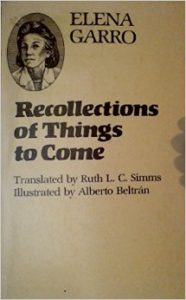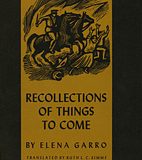Recollections of Things to Come (Los recuerdos del porvenir) – Elena Garro – 1963

Posted by Guillermo Maynez on 8/12/2012, 11:47:15
Remembrance/Recollections of Things to Come
I finished last night, and I thought it was very, very good. I’m sorry for not having read this before, one of the best Mexican novels ever. It’s strange to think this was published four years before “One Hundred Years of Solitude”: Ixtepec has a lot of Macondo there, only having less on the “Magical Realism” side, and much more on the brutal realism aspects. I won’t start posting comments until everybody else is ready, but I have a first question: What really happened to Julia and Felipe Hurtado?
~
Posted by Steven on 9/12/2012, 22:44:05, in reply to “Remembrance of Things to Come”
I’m only about a third of the way through, but enjoying it very much. I should be able to pick up the pace in the next couple of days. Yes, the magical realism is more restrained: nobody floating off into space with the laundry. Instead it is (so far) focused mostly on language: words kept under a hat or rolling about on the floor. Language inhabits (and represents) a magical world, but the characters live in a world of harsh reality.
~
Posted by Steven on 10/12/2012, 20:05:24, in reply to “Re: Remembrance of Things to Come”
Guillermo, a question about Mexican history, if you don’t mind.
The story is taking place in the mid-1920s when Plutarco Elias Calles was president. He is described in Wikipedia as being a populist in favor of land redistribution, which I would assume means taking the land away from rich landlords and the church and distributing it to the peasants. So why, in the first part of the novel, are his soldiers killing the poor Indians and taking their land?
The second half of the novel deals with the Cristero War which does seem consistent with what I’m reading elsewhere.
~
Posted by guillermo maynez on 11/12/2012, 11:59:00, in reply to “Re: Remembrance of Things to Come”
The process of Agrarian Reform was a nightmare. Can you believe we still have an “Agrarian Reform Department”? Once in a while, even now, a community produces an edict, supposedly issued by a Viceroy in Colonial times, giving a certain portion of land to the said community, and so they ascertain rights of property!
Now, for all their differences, Calles and his associate Alvaro Obregon were far from populists: they did believe in the need to divide ancient and huge “latifundios” (enormous property), but without destroying productive infrastructure and maintaining economic feasibility. In short, they wanted to do it in an orderly fashion. But it would be a fantasy to imagine that they had full control of every piece of the Mexican territory. What had happened was not so much a Revolution (in the classical definition), but a total institutional collapse which, to this day, left vast portions out of the proper control of the State, and in the hands of local warlords and political bosses. So, in spite of everything that Calles might have wanted to do, what the novel describes is very credible: General Rosas acts like a temporal local dictator, dispensing favors in return for kickbacks from the junior Garro portrays in her book. It’s hard to convey the level of legal disorder that reigned in those times, and especially in the state where (most likely) the novel takes place: Guerrero.
Imagine it like this: Ixtepec’s Indians cultivate lands over which they have no proper Title of Rights (property), based on ancient and ill-defined communal rights. As the novel explains, the junior would kill a family of Indians, move the boundaries of his own property to include the Indians’, pay off Rosas and then achieving one of two possible outcomes: 1) keeping a large amount of land for himself, in the hope Agrarian Reform would take decades to reach him (not an impossible situation); or 2) pretending to be the owner of more land than originally, and then keeping a reasonable chunk even if land distribution got him. Rosas would get an attractive bribe. As you can see, the racism was not short of the Klan’s in the US, and if you add to that the legal voids, you have the perfect situation for a massive appropriation of land, which then could be legally distributed among family and friends to make it pass for “small” property. I hope this helps and if it does, I’d be happy to try to explain some other questions you may have.

Posted by Steven on 11/12/2012, 15:29:27, in reply to “Re: Remembrance of Things to Come”
Thanks a lot, Guillermo, that does clarify it. I was beginning to see it that way from various remarks that were sprinkled through the text.
Recalling my reading of The Power and the Glory, I realized that the Cristero War was also a phenomenon where there was much local variation in the implementation of national policy.
I finished the book last night, after getting so caught up in it I read most of it in one go. It’s really a remarkable novel, both in the story it tells and the way it tells it. I really like the restrained way in which Garro uses the magical side of magical realism.
It might be only the two of us reading this, which is a shame. When I checked a couple of weeks ago Lale said she would have to wait before ordering it. Sterling and Joffre weren’t planning at that time to read it. But I’ll wait until we’re sure before posting more comments (and my theory about Julia and Felipe).
~
Posted by Steven on 21/12/2012, 21:54:29, in reply to “Re: Remembrance of Things to Come”
I think it’s just the two of us on this one, Guillermo. Pity! So I’m going to go ahead and start posting my comments.
To answer your question, I think Felix and Julia were killed. The scene of their riding off on a horse is an illusion, just like the idea that Julia has been spotted in other parts of Mexico. There was a reference in the second half of the novel to Julia’s death, and if she had lived I don’t think General Roses could have stopped thinking about her. He would have had her followed.
Do you think Julia is meant to be a symbol for Mexico? Both she and Isabel are very enigmatic in different ways.
This is my favorite quote from the novel:
“One generation follows another, and each repeats the acts of the one before it. Only an instant before dying, they discover that it was possible to dream and to create the world their own way, to awaken then and begin a new creation…. For several seconds they return to the hours that guard their childhood and the smell of grass, but it is already late and they have to say goodbye, and they discover that in a corner their life is waiting for them, and their eyes open to the dark panorama of their disputes and their crimes, and they go away astonished at the creation they made of their years. And other generations come to repeat their same gestures and their same astonishment at the end. And thus I shall go on seeing the generations, throughout the centuries, until the day when I am not even a mound of dust, and the men who pass this way will not even remember that I was Ixtepec.”
~
Posted by guillermo maynez on 26/12/2012, 11:30:05, in reply to “Re: Remembrance of Things to Come”
It’s a great quote, certainly, and the Town as narrator seems to me to be a great idea. It really gives depth to the passing of time, and adds an epic sense to the sordid affairs that constitute the novel. Garro is very good at recreating the ambience of the town; I could really see and place the houses, the square, the streets, etc., visually. It helps, of course, that she is speaking of my country and that I’ve been to towns like Ixtepec, but nevertheless I think the stage is very well presented.
I am still not very sure about the symbolic interpretations that could be ascribed to the novel, but I can still feel the shock at the veracity of the portraits of several types: the Revolutionaries’ lovers, small-town girls lost in the maelstrom of the Revolution; the people of Ixtepec, recognizable in every town; and above all General Rosas as the prototypical Mexican Macho: it has always astonished me how, in the Ranchero songs, supposedly strong-willed men, MEN in capitals, cold-blooded murderers, weep and weep every time a girl leaves them. Why not find another woman and forget the “traitor”? Weren’t they supposed to be larger than life and the minute the girl walks away they drown themselves in alcohol and sing in desperation? Rosas is the epitome of that kind of guy.
Other themes to be explored: fear of foreigners (Felipe Hurtado), and incest (the Moncadas, Nicolás and Isabel).


